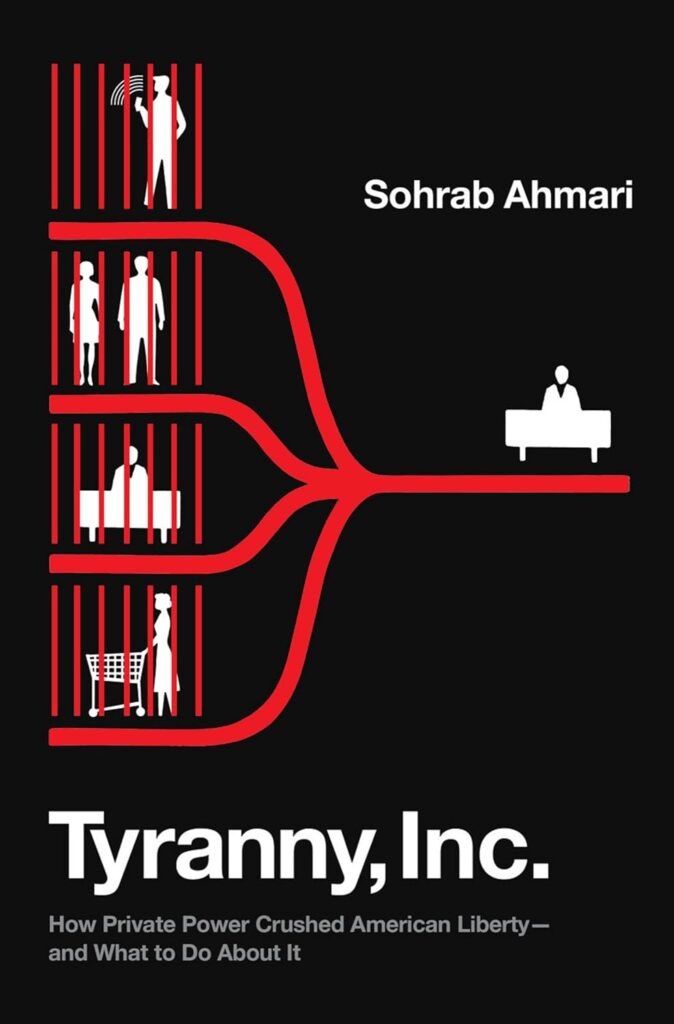Despite a mistaken reverence for the New Deal, Sohrab Ahmari makes a compelling case that economic reform should be a right-wing issue.
Tyranny Inc.: How Private Power Crushed American Liberty—and What to Do About It
by Sohrab Ahmari
Forum Books
288 pp., $28.00
One of the primary conceits of Americans is the notion that they are free. They believe they are free to say what they want, do what they want, and live the way they want. Unlike their forefathers, who rebelled against a king, or people in the Third World, who groan under the boot of an unelected autocrat, Americans today think they can rest easy in the knowledge that they live in a nation of abundant freedoms and unmatched prosperity.
Except this isn’t quite true. Most people really aren’t free to do, say, or live the way they want. Their employers determine the real extent of their freedoms; or their service providers, vendors, bankers, or the army of lawyers and legislators who regulate all economic activity. The dream job, dream home, or any variation of the American dream remains just that for most people—just a dream. People today are forced to live within their limited means and to think within the limited boundaries of politically correct speech.
For the most part, voices on both the right and the left continue to insist that the system is free, fair, and functional.
One commentator who consistently strays from this consensus, rightly identifying problems with the modern economic and political system, is the conservative writer and editor Sohrab Ahmari. In his newest book, he calls out the hypocrisy of today’s American economy, which enriches unaccountable oligarchs, exploits workers, and undermines democracy. He argues instead for a social democratic system along the lines of Franklin D. Roosevelt’s New Deal, in which the government is empowered to protect workers, consumers, and the American way of life.
Knowing he’s treading on hotly contested ground, Ahmari begins his book by reframing the argument. He challenges the assumption that today’s capitalist system is truly free. Whereas supply-side economists like Milton Friedman insisted the capitalist economy is noncoercive because employers and employees enter into an agreement with one another freely, Ahmari notes that this freedom is subverted by a “shocking power imbalance between asset owners and everyone else.” He opens his case by stating:
Relatively few people hold the power to lend or invest their surplus funds for interest (or not), or to lease their real property for rent (or not), to put their farms and factories to productive use for profit (or not). Most others have only the power to sell their labor and subject themselves to the coercion of the owner class…
This results in a system that is both inequitable and inefficient. First and foremost, it places severe limits on today’s employees, who are forced to submit to the abuses of their employers. Ahmari gives examples of white-collar employees intimidated into keeping quiet about harassment, professional malpractice, and continual invasion of privacy; if they don’t, they are fired and blackballed from their industries. The same goes for blue-collar workers who find the terms of their contract changed repeatedly. Without any kind of leverage, they are compelled to take on longer hours, unworkable schedules, arbitrary pay cuts, and other indignities.
What’s worse is that corporate law legitimizes and endorses this kind of activity—that is, if an employee isn’t forced to take his chances in private arbitration. Ahmari shows just how unfair these arbitration proceedings can be, draining the resources of aggrieved employees and inevitably denying them justice.
At this point, the pro-business conservative might object that even if a few workers might suffer in today’s economy, it’s still the best option for businesses and consumers. Ahmari addresses this by demonstrating that employers who neglect their workers fail in other respects as well. He cites the tragic history of the iconic retailer Sears, which went from selling goods and services all over the country for more than a century, to bankruptcy in 2018. This decline was due to an ownership arrangement where, Ahmari writes, “Wall Street financiers … siphon away productive capital from the real economy into the financial economy—which is to say, into their own asset ledgers, workers and communities be damned.”
Private equity firms and hedge funds will take ownership of a company and turn a quick profit by selling assets, cutting costs, and masking this activity with flashy marketing and aggressive accounting. In the short run, the company sees a boost in revenue and raises the value of its shares. In the long run, it loses business and collapses.
This same dynamic can be seen in many other industries, including public services that have been privatized, such as emergency responders. Private ownership of police, fire, and ambulance services tends to cut costs with slower response times and less qualified responders, and boost revenue by sticking unsuspecting residents with a hefty bill. Ahmari illustrates this with a story of a young family who lost its mobile home to a fire but was nonetheless stuck with a bill from private emergency response business. “They received a surprise bill for $19,925 from a private firefighting firm that they hadn’t called, that had shown up long after the local fire department, and that had barely done anything to help,” he writes. Not only does this result in inferior service and crippling expenses for poor Americans, but in many cases, the pension funds of formerly public first responders are being used to enable this scam.
After devoting a chapter to another victim of Wall Street predations, the local newspaper, Ahmari then discusses yet another component of corporate tyranny: distorted bankruptcy laws. Normally, if a company creates a bad product, it will lose money and be held liable in lawsuits from harmed customers. There are legal workarounds, however, that allow companies (Ahmari mentions Johnson & Johnson and Purdue Pharma) to continue operating and profiting, even after their products poison and kill people.
Ahmari looks to the past to find solutions to modern problems, searching for a time when there was a viable alternative between corporate oligarchy and authoritarian socialism. He points to the three “glorious” decades of FDR’s New Deal social democracy that followed the end of World War II. In those days, workers were able to organize and mount a countervailing force against employers, allowing them to earn a living wage and support a family, he argues. Businesses produced products that made people’s lives better, leading to a higher standard of living. There was far less financial inequality and, by extension, far less corporate tyranny. Politically speaking, American citizens were represented by the people they elected, not ruled by people who hoarded the nation’s assets.
Was the New Deal system perfect? Ahmari admits it was not. While industries in Japan and Germany that competed with the U.S. profited from the globalist system designed to contain the spread of communism, America’s New Deal economy was hampered by:
wage-price-driven inflation of the 1970s; oil shocks triggered by the 1973 Yom Kippur War and Iran’s 1979 Islamic Revolution; the complacency and sclerosis of some U.S. manufacturers and labor unions; and the urban malaise and crime that … rendered American cities miserable to inhabit.
That said, Ahmari believes that the neoliberal revolution of leaders like Ronald Reagan and Margaret Thatcher swung too far in the other direction.
Overall, Ahmari’s latest is an important contribution to the reformation of the American economic system and reversing its decline. Most conservatives simply lack the vocabulary to question free market dogma. They shy away from the topic for fear of triggering unfair criticism from those who dismiss any such questions as shameless socialist propaganda.
In all fairness to those critics, Ahmari’s work reveals certain weaknesses. He has a convert’s zeal that sometimes prevents him from inserting crucial caveats. Among the most apparent, he ignores the substantial lack of innovation, adaptability, and economic growth within the social democratic welfare states that never really had a neoliberal revolution, such as those that occurred in continental Europe. Furthermore, he never mentions the massive disruptions to the workplace that were caused not by political innovation but by automation and digitization. And he minimizes the role of private and public unions in devastating so many communities with disastrous labor strikes and unreasonable demands. There’s a multitude of reasons why the world works the way it does, and the blame cannot simply be laid at the feet of avaricious elites.
However, the biggest weakness in Ahmari’s case has to be his naive take on the New Deal, which played a major role in turning the American federal government into the Leviathan it is now. It should be a given that placing so much power in the hands of unaccountable bureaucrats will quickly undermine any democracy, but this never comes up. Ironically, in his arguments against corporate tyranny, Ahmari loses the thread and ultimately ends up justifying a government tyranny.
Nevertheless, Ahmari makes a strong case that the American economic system needs to be reformed in favor of the working classes. Otherwise, we can expect to see it drift further into corporate tyranny or to erupt into a violent populist revolution. The status quo cannot hold, nor should anyone want it to. The United States was founded on the idea of freedom and self-governance. This is only possible with an empowered workforce that actually has the means to rule itself and resist all forms of public and private tyranny.


Leave a Reply